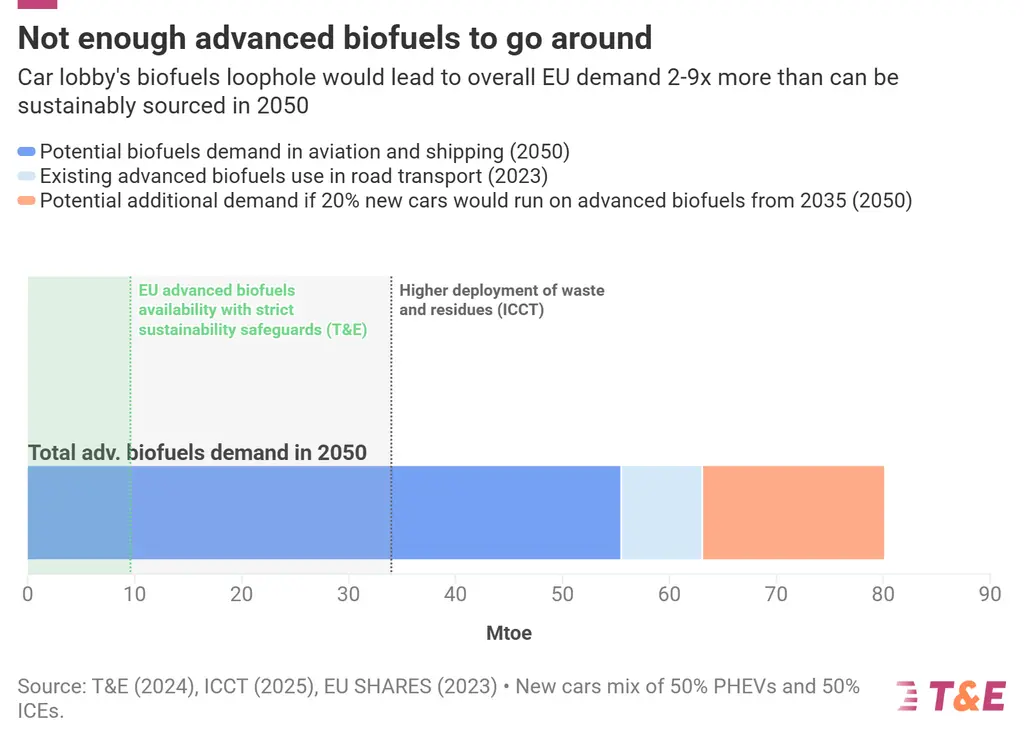50% European truckmakers’ emissions are 50% higher than what they report to investors.
Download documents
European truckmakers’ emissions are 50% higher than what they report to investors, a new Transport & Environment (T&E) study shows. The research looking at Europe’s leading truckmakers - Scania, MAN, Renault, Volvo, Mercedes-Benz, DAF and Iveco - shows that investments in truckmakers are more carbon intensive than oil, steel and cars [1]. With mandatory scope 3 reporting kicking in for investors this year [2], T&E calls on all truckmakers to switch as fast as possible to zero emission models to avoid becoming portfolio ‘carbon bombs’.
European truckmakers have already started to publish sustainability reports, but, to date, there has been no legal requirement to report on indirect emissions - known as scope 3. The average truck burns through 450,000 litres of fuel over its lifetime, which accounts for 99.8% of a truckmaker's total carbon impact.
T&E’s analysis shows that Mercedes-Benz and DAF fail to report on their scope 3 emissions entirely and as a result report just 0.1% to 0.2% of their overall emissions. IVECO only reports around a third of its scope 3 emissions, while Renault and Volvo also underestimate their emissions. MAN and Scania’s reporting is accurate [3].

Xavier Sol, director of sustainable finance at T&E, said: “Truckmakers have had an easy ride so far on the financial markets, as their true climate impact has been hidden from investors. This is changing. As the true extent of truckmakers’ scope 3 emissions becomes clear, the industry could be in for a serious shock. To avoid being seen as portfolio carbon bombs, truckmakers need to switch to zero-emissions as quickly as possible.”
Truckmakers are already a more carbon intensive investment than other heavily polluting industries, like oil and steel, in terms of reported carbon emissions per euro of revenue[4]. The only sector T&E could find with an average carbon intensity higher than truckmakers is coal mining. The truckmakers with the most comprehensive scope 3 reporting - MAN and Scania - pay a penalty in terms of disclosing a higher carbon intensity. Starting next year, all truckmakers in Europe will need to disclose their scope 3 emissions to investors.

Less than 3% of heavy-duty vehicle sales today are electric compared to 15% for cars. If EU truckmakers exclusively sold zero-emission vehicles, like Tesla and BYD already do, their carbon footprint could fall by 95%. A new EU regulation voted earlier this month requires truckmakers to increasingly sell zero-emission vehicles. T&E analysis shows this will already cut their emissions by 29% by 2030.
On 10 April, the EU finalised a new law to clean up CO2 emissions from heavy-duty vehicles (HDVs). The law mandates truck and bus manufacturers to sell an increasing share of zero-emission vehicles starting from 2025.
Xavier Sol said: “Truckmakers are currently one of the most carbon intensive investments on the market. But new EU truck CO2 standards will cut truckmakers’ emissions by nearly a third. The quicker truckmakers switch to electric, the more attractive they will become to investors.”
The study also highlights the failure of ESG ratings to give a true assessment of the climate impact of truckmakers, with most rating agencies giving truckmakers sustainability scores comparable to some renewables manufacturers[5]. Mercedes-Benz, for example, performs better on Bloomberg’s environmental score than Siemens Gamesa - a wind turbine arm of Siemens. This is largely because less than 3% of Bloomberg’s environmental score is based on scope 3.
There is also very little correlation between scores across different providers. Daimler is the top-performing truckmaker according to Sustainalytics, another rating agency, yet receives among the lowest scores from the other two providers (Bloomberg and S&P). This limits the usefulness of ESG ratings, says T&E. As far as road transport is concerned, the EU Taxonomy better reflects a truckmaker’s true environmental performance, as it directly accounts for the ratio of green investments and revenues linked to zero emission trucks.
Notes to editor
[1] A key metric for investors assessing a company’s environmental performance is its carbon intensity, expressed as tons of CO2 emitted per million euros of revenue.
[2] The European Sustainability Reporting Standards (ESRS) mandate large companies to perform and publish their sustainability report. Truckmakers will disclose their scope 1, 2 and 3 CO2 emissions starting from the financial year 2024 (reporting by end 2025 on 2024 data). The EU’s Regulatory Technical Standards supplementing the Sustainable Finance Disclosure Regulation (SFDR) also mandate financial institutions to fully disclose their scope 1, 2 and 3 emissions by June 2024 (reporting due by 30 June 2024 on 2023 data).
[3] T&E takes a conservative estimate by only considering one of the 15 categories of scope 3 emissions (use of sold products). This constitutes between 94% and 97% of truckmakers' total. T&E also uses CO2 emission factors from the EEA, which are based on what companies disclose and are normally lower than real-world factors. In reality, truckmakers’ emissions are therefore likely higher than estimated by T&E in this analysis. On top of that, the estimate for MAN is lower as we do not include in our calculations the 21,600 vans they sold in 2022. We therefore judge MAN and Scania’s reporting to be accurate, rather than overreporting.
[4] Carbon intensity is calculated from CO2 emissions and revenue as reported by the companies themselves.
[5] SunPower Corp, Vestas Wind Systems, Siemens Gamesa Renewable Energy (renewable energy equipment manufacturers), and Brookfield Renewable Partners (renewable energy provider) are among the most sustainable companies according to the Corporate Knights’ ranking, with 100% sustainable revenue and investments. However, they all score lower than Volvo in the Bloomberg ‘E’ score. Likewise, they all score worse than Daimler in Sustainalytics' score.


